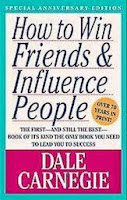People
|
|
The first book I ever read on what made people tick, How to Win Friends & Influence People started me down the path of understanding the various nuances of humanity. Particularly, what influenced a person to decide to go one way or the other when faced with a problem. Having a deeper understanding of that increases your ability to communicate with other people, to deal with the various personalities you come up against. And just as add-ons increase your ability to play WoW, a book like this is another tool to win people over, to get them to see your side of things -- which is the very first step in becoming an effective leader and team builder. |
| How to Win Friends and Influence People Author: Dale Carnegie |
|
The Five Dysfunctions of a Team was first given to me by my boss at the web agency where Ater and I worked together. It tells curious story of freshly hired senior director, tasked with assessing why a company was coming apart at the seams, and what could be done to turn it around. It is a very light read, and is a fascinating look into how the various ways teams go bad, each reason laying into the next. Reading this book gave me the epiphany to translate Lencioni's dysfunctional pyramid into WoW raiding terminology, producing my forum topic: "Why Raid Teams Fail". |
|
| Author: Patrick Lencioni | |
At the tail end of Wrath of the Lich King, I had a new set of challenges to deal with in leading Descendants of Draenor. At the six year mark, I had a reasonably solid foundation on how to build a great team and incentivize them, but when Blizzard changed the rules of raiding, I had to change my rules as well. I was bracing for every excuse in the book as to why players would opt out of 25s for the now "equal" 10s, so I turned to Leadership Without Excuses. This book dove deeper into leadership techniques, showing me the three types of people I'd go up against: Saints, Sinners, and Save-ables. It offered a fascinating look into how people try to bend the rules for their own agendas, and how to stop it from happening. |
|
|
Authors: Jeff Grimshaw and Gregg Baron |
|
Shortly after the death of the 25-Man progression team, I turned to reading material in order to better understand why things fell apart, and what (if anything) could have been done to save it. A highly recommended book came way in the form of Peopleware. Reading it was an eye-opening endeavor. Mostly geared towards managing teams in an office, it still provided amazing insight into things I experience in my guild every day...and the book was written 30 years ago. Chapters that hit home for me included "The Hornblower Factor", "The Whole is Greater Than the Sum of its Parts", "The Black Team" and "Competition". Truthfully, there are vital nuggets of information in every chapter, and both white-collar bosses and nerdy guild leaders will have plenty to take away from this book. |
|
|
Authors: Tom DeMarco and Timothy Lister |
|
 |
One of the newest books to my reading list, You Are Not So Smart offers up a clever, easy-to-follow trip down a road of varying psychological and sociological ways we fool ourselves (and others) into seeing things that don't happen, or believing things that simply aren't. This book exposed me to "Cult Indoctrination", "The Dunning-Krueger Effect", "The Fundamental Attribution Error", and "The Public Goods Game", among many others. These dormant, subconscious anomalies of the human mind helped me understand why my guildies made decisions in a semi-hypnotic state, why some poor players never stop standing in the fire, and how I had misjudged people based on a certain situation, rather than a reflection of their character. This book even confirmed my suspicions as to why 25s were doomed from the start of Cataclysm. A must read for all. |
| Author: David McRaney | |
 |
The sequel to You Are Not So Smart, this new title by McRaney delves further down the rabbit hole of the human mind. Reading this book taught me about "The Halo Effect", explaining why I continually swept players' deficiencies under the rug, and "Deindividuation", a condition explaining why PvPers are commonly seen as douchebags, while PvEers are seen as elitists. Other chapters painted a clearer picture around why players continue to defend WoW's changing design when presented with data that spoke otherwise (The Backfire Effect), what causes raiders to stay silent when asked if they understand a boss strategy (Pluralistic Ignorance), and even explains why casuals and hardcores never see eye-to-eye on World of Warcraft (The Illusion of Asymmetric Insight). Do not miss this book in your quest to become a better leader, and better understand people...as well as yourself. |
| Author: David McRaney |




